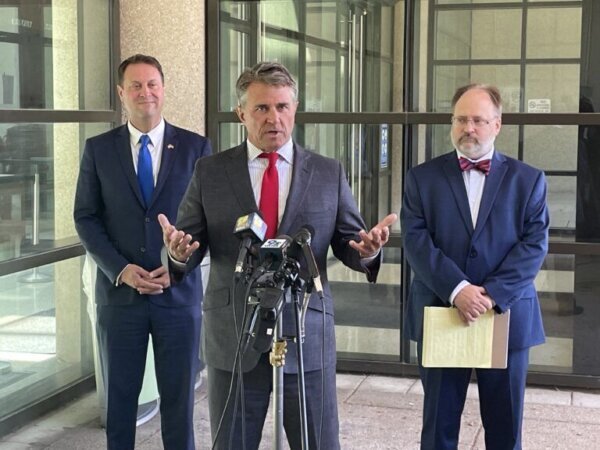This article was republished with permission from WTOP’s news partners at Maryland Matters. Sign up for Maryland Matters’ free email subscription today.
Attorneys representing the Maryland State Board of Elections are asking a federal judge to dismiss a lawsuit that alleges voter roll irregularities and other election law violations in the state.
Two groups — Maryland Election Integrity LLC and Missouri-based United Sovereign Americans — filed suit in March against the state board for maintaining inaccurate voter registration lists and violating federal election law. Earlier this month, the groups asked U.S. District Court Judge Stephanie A. Gallagher to issue an injunction against the state that could derail the May 14 primary and possibly the general election in Maryland.
On Monday, an attorney representing the board responded, asking Gallagher to dismiss the lawsuit or, at a minimum, deny the request for the restraining order.
“The companies’ complaint, however, fails to vest this Court with jurisdiction to entertain their accusations; and fails to factually allege a claim upon which relief could be granted. The companies allege no ‘injury in fact’ explaining how their allegations of election maladministration injured any individual member,” wrote Daniel M. Kobrin, an assistant attorney general representing the Maryland State Board of Elections.
Kobrin, in his motion, writes that the two groups failed to establish standing and that their lawsuit “lacks a cognizable factual claim.”
Maryland Election Integrity LLC and Missouri-based United Sovereign Americans filed suit in March alleging problems with the state’s elections.
The group alleges that it found at least 79,392 voter registration violations. Included in what the group said it found through “meticulous analysis” were duplicate registrations, “registrants with questionable inactive status,” and more than 40,000 with “instances of a questionable registration date.”
The two plaintiffs further claim that “voting system error rates are exponentially above the maximum allowable error rates. Inaccuracy and the specter of fraud have irretrievably damaged the reliability and credibility of results.”
The group also alleged that the state board thwarted their efforts by denying requests for election reports made under the Maryland Public Information Act.
The plaintiffs, represented by Annapolis Attorney Ed Hartman, asked Gallagher to prevent the board from certifying election results until the errors are fixed. Hartman represented Dan Cox, then the Republican nominee for governor, in a failed 2022 bid to block the early counting of mail-in ballots that year.

Those allegations were characterized as being “without merit and based on flawed methodology and incorrect calculations,” state elections officials said in a statement Monday.
“Maryland voters can cast their votes with confidence that the voter registration system is accurate, current, and maintained in accordance with all applicable laws and regulations,” State Elections Administrator Jared DeMarinis said in a statement. “I commend the local boards of elections and election officials who maintain the integrity of our voter registration system and our elections.
“We will correct the record in our fight against the spread of misinformation,” DeMarinis added.
In 2023, a report released by the Office of Legislative Audits raised concerns about the board’s efforts to identify and purge the deceased from voter rolls as well as a time lag in reporting people who allegedly voted more than once.
DeMarinis said at the time that the report exaggerated the number of potentially dead people among the 4.1 million people registered to vote in Maryland.
In the statement released Monday afternoon, elections officials said the same audit “showed that the SBE maintained the voter registration system with minimal inaccuracies. The audit revealed that local boards of elections, using information from its partner agencies and the State Board, successfully removed 99.38% of all voters who died from the voter registration list. Additionally, in a voter registration database of 4,148,651 active voters, only 0.00645% of those records were duplicates — approximately 268 records.”







